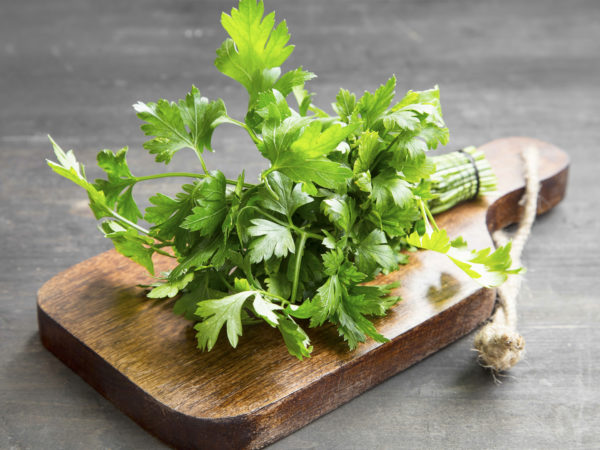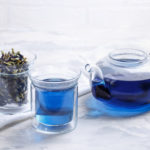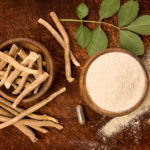Parsley

Parsely (Petroselinum crispum)
Parsley is an herb native to the central Mediterranean region. It is now cultivated worldwide. In temperate climates it is a biennial (flowering every two years) and in subtropical and tropical climates it is an annual. There are two types, curly and flat leaf, both with bright green leaves. The leaves, seeds, oil and root of the parsley plant are used for medicinal and culinary purposes.
Used for:
Traditionally, parsley has been used to treat a variety of gastrointestinal concerns, as a diuretic, to help stimulate the appetite, and to increase menstrual flow. Chewing the fresh leaves is a traditional, effective breath freshener, and chewing the seeds can reduce gas and bloating.
Parsley can be applied topically to the skin to help address chapped and cracked skin, insect bites, and bruises. It is a good source of flavonoids and antioxidants, as well as folic acid and vitamins A, C and K.
Available in:
Dried and fresh leaf, oil and seeds.
Herb / drug interactions:
Parsley is a rich source of vitamin K, which assists blood clotting. Consequently, it may decrease the effectiveness of warfarin and other blood thinners. As parsley is a natural diuretic, avoid taking it with water pills to minimize the risk of dizziness and a drop in blood pressure. Do not take with lithium because of its diuretic effects.
Other safety concerns:
In amounts typically consumed as part of meals, parsley is likely to be safe for women who are pregnant, but larger, concentrated amounts found in supplements should be avoided during pregnancy to minimize the risk of miscarriage. People with kidney disease should also avoid large amounts of parsley. For the general population, very large amounts of parsley can lead to side effects such as anemia, liver or kidney problems, and some people may have an allergic reaction to parsley seed oil when it is applied to the skin.
When buying:
Look for high quality products from reputable supplier. Purchase organic parsley when possible for cooking and tea preparations.
Dosage:
The usual amount of leaf and root used therapeutically is one to two grams taken up to three times per day. Less is used of the seeds, generally 500 mg up to three times per day.
Child dosage:
The dose for children is not known.
Dr. Weil says:
Parsley used liberally as a food garnish shouldn’t be overlooked, as it is a good source of certain important nutrients. One cup of parsley contains fewer than 25 calories but provides over 100 percent of the daily value (DV) of vitamin A, 133 percent of the DV of vitamin C and a whopping 1,230 percent of the DV of vitamin K. Don’t be afraid to nibble on the sprigs on your plate!
SOURCES:
Parsley. Natural Medicines Comprehensive Database Consumer version. Stockton, CA: Therapeutic Research Faculty, Updated February 15, 2012, accessed February 20, 2014 at http://naturaldatabaseconsumer.therapeuticresearch.com/nd/Search.aspx?rn=4&cs=NONMP&s=NDC&pt=100&id=792&fs=NDC&searchid=45310341Parsley, Self Nutrition Data, accessed February 20, 2014 at
http://nutritiondata.self.com/facts/spices-and-herbs/199/2Meyer, H. , Bolarinwa, A. , Wolfram, G. , & Linseisen, J. (2006). “Bioavailability of apigenin from apiin-rich parsley in humans.” Annals of Nutrition and Metabolism
Reviewed by Tieraona Low Dog, M.D., March 19th, 2014.









